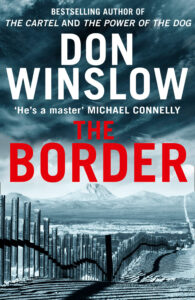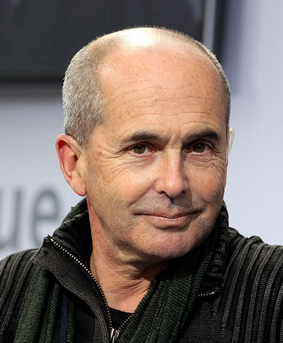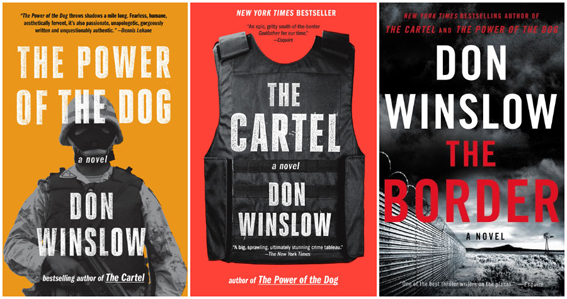Don Winslow, The Border (2020)
Review by Lee Horsley

In The Border, the extraordinary final novel of his cartel trilogy, Don Winslow “wanted to bring the war home”, to bring alive for his readers the truth that “It’s not the Mexican drug problem, it’s the American drug problem.” (GQ interview). He makes this reality present to us in bloody, brutal, often harrowing scenes. The novel is both utterly involving and deeply compassionate, creating for us a vast panorama of greed-wrought devastation.
One of the novel’s great strengths is the clarity with which Winslow lays bare the complex interconnections of the drug war. Most scathingly, he exposes the culpability at the highest levels, where the guilty thrive on the wealth generated, insulated by their power. At the other end of the spectrum, Winslow tells the story of Nico, a ten year old boy at the very bottom of the heap, desperately trying to survive in the terrifying, vicious world of a garbage dump in Guatemala. Preyed upon by older boys already in gangs, Nico reflects, “It’s the way of the world… Everyone passes up to someone. Maybe somewhere at the very top, there are men who just collect and collect, but he has no idea who those people are.”

Winslow’s multiple narratives take us in vivid detail all the way from the slums of Guatemala City to highest reaches of American government and society. The accuracy of Nico’s intuition about how this exploitative world works is apparent throughout the novel, which interweaves several richly detailed stories: there is the desperate plight of a Staten Island heroin addict; the risks taken by an upright policeman who pretends to be a dirty cop so that he can go undercover; the carousing and plotting of ‘Los Hijos’, the inexperienced heirs of the old cartel bosses, now fighting for control in the power vacuum left by the death of the head of the Sinaloa cartel, Adán Barrera; the political battles being fought by the beleaguered Arturo ‘Art’ Keller, the newly appointed head of the DEA; and, at the inglorious top, a newly elected American president – one of the men who, in Nico’s words, “just collect and collect”.
Keller, who in the first two novels of the trilogy (The Power of the Dog and The Cartel) was fighting a gruelling, hands-on war with Barrera, is now in Washington DC, reluctantly heading the DEA and struggling without much optimism to change the federal approach to the drug war. His goal is to expose the fact that the drug cartels are buying influence “at the highest levels of the United States government”, but his efforts are undermined by the fact that there are overwhelmingly powerful men fighting to maintain the status quo, with drug money fuelling the rapacity of powerful financial and political interests:
“Do you seriously believe anyone really wants to win this war? No one has an interest in winning this war; they have an interest in keeping it going. You can’t be that naive—tens of billions of dollars a year in law enforcement, equipment, prisons … it’s business. The war on drugs is big business.”
The names have been changed, but not to protect the innocent. It is a world in which innocence is in short supply, and there is little doubt about the identities of those at the very top of the political world. John Dennison (a thinly veiled Trump) and Jason Lerner (the Jared Kushner stand-in) are responsible for actions that are all too plausibly shown to be part of corruption so systemic and corrosive that there seems little chance of prevailing against it. The Border is a bold and comprehensive attack, a dark vision of the mendacious, greed-driven world of those currently in power: interviewed by the New York Times, Winslow says, “I know this book is going to make some people angry. I can live with that.”

